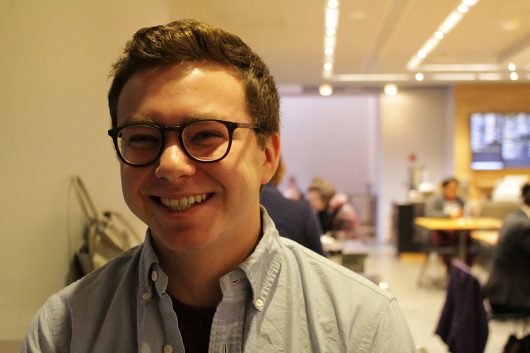
Adam Rukin is a fourth-year in mechanical engineering and current VFA fellow.
For students hoping to work in startups and who don’t mind moving somewhere nontraditional, Venture for America might be the place to start.
VFA is similar to Teach for America in that it places college graduates from around the country in different startups, much like Teach for America would place graduates in an underserved school. These VFA fellows work as full-time employees for the startup company and gain the experience and connections required to create a business from scratch.
Since its inception in 2011, 25 percent of the people who completed the two-year fellowship went on to start their own company, according to the program’s website.
“Rather than sending people to New York, Chicago or Boston, where a lot of college grads move, this is supposed to be reallocating talent in a more efficient way,” said Lauren Tiberi Warner, who graduated from OSU’s Fisher College of Business in 2014 and is a 2015 VFA fellow.
Tiberi Warner said she turned down a full-time job offer to be a consultant in Chicago to work for a startup in Baltimore called Blispay, a financial technology company.
“For me, it was a chance to try something that was completely different than what I think the average student at Ohio State or in the business program was doing at the time,” Tiberi Warner said. “Most of my friends were going into banking, consulting, working in corporate finance, and I was going to work at a startup.”
Tiberi Warner was the first OSU student to become a VFA fellow, and after she paved the way, four more VFA fellows have been accepted from OSU. Among them is Adam Rukin, a fourth-year in mechanical engineering.
“I was first introduced to VFA at the beginning of my senior year,” Rukin said. “I was ending my internship in the summer and then I was starting to think, what type of role, what type of companies, what type of team, really, do I want to pursue after post grad.”
Rukin said that he first learned about VFA through Matthew Shaver, a 2016 Fisher alumnus and a current VFA fellow.
“It was a phenomenal relief to find something that I was super interested in, but, also, to know that it was a really good fit,” Rukin said. “I’m currently in their matchmaking process, which is helping to find a mutual startup where I would be working and also what city I’ll be living in.”
Tiberi Warner said this process introduced her to a vast network of useful connections and that the choice of city was important.
“It introduced me to Baltimore, which is a super cool city that I knew nothing about, never would have been to and definitely wouldn’t have moved to without VFA,” Tiberi Warner said.
Before traveling to various cities and startups, VFA fellows attend “Training Camp,” which is a crash course in various entrepreneurial skillsets, from marketing basics to simple programming. It’s also a chance to network with other VFA fellows, Rukin said.
VFA aims to increase entrepreneurial endeavors by allowing fellows to learn integral skills directly from successful startups so that those fellows have the capacity to create their own business from scratch, said Rukin. This all helps to manage the risks involved in startups.
“The roles and responsibilities, and even the funding and finance that come along with growing a company, and the ambiguity of working in a situation where you might not necessarily talk to your manager for a week or two or they can’t really afford to spend the time to define what role you’re going to be in,” Rukin said. “That’s where there’s risk, but there’s also reward with that.”
Training with entrepreneurs who have dealt with these challenges helps to lower the uncertainty of starting a company from scratch because it provides a base knowledge of essential skills, Rukin said.
“I don’t really feel afraid to start a business if I wanted to,” Tiberi Warner said. “The biggest thing in starting a successful company is knowing the space and really caring about the problem you’re trying to solve and then getting people to buy it… it’s about really caring about that idea and then it’s about execution.”
Rukin said that recent college graduates are in a position to explore entrepreneurship.
“I think graduating college is a time in most everyone’s life where there’s the opportunity to be as idealistic as possible,” Rukin said. “You’re going to get a fresh piece of paper, minted with your name on it, it’s a big accomplishment, you’ll get some gifts and all that. But beyond it, there’s no other road map you need to follow, you can go in any direction. You should be able to feel, on graduation day, that anything is possible.”


